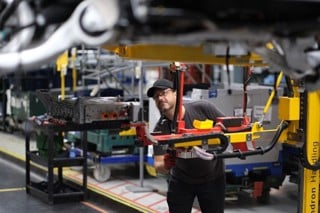The author of an influential report says the Government has a lot to learn from how company car tax is helping drive down emissions.
New cars registered in the UK last year were, on average, 18% more fuel efficient than the average car on the road, according to figures released by the Society of Motor Manufacturers and Traders (SMMT) in its annual New Car CO2 report.
In 2011, CO2 emissions fell by 4.2% year-on-year to 138.1g/km (equivalent to 52.5mpg), down by more than 23% since reporting began in 2000.
However, on a sales-weighted basis, average new CO2 emissions for fleet cars were 1.7% below the private buyer average, at 137.1g/km and 139.5g/km respectively.
Matthew Croucher, economics manager at the SMMT and author of the report, called for a more consistent approach from the Government to help drive down emissions further.
“Company car tax has played a vital role in driving consumers towards lower-emitting vehicles,” he said.
“It has always had a forward-looking aspect, which is very important as it enables drivers to make long-term choices. I think if we saw more of that with other taxes such as vehicle excise and fuel duties that would be really helpful.
“It’s useful to have long-term policy outlooks and consistent approaches because it would allow manufacturers to plan better and consumers to plan their purchases better.”
In 2011, almost half of new cars (46.8%) had emissions below the 2015 European legislative target of 130g/km CO2. More than 65,000 vehicles were exempt from VED with sub-100g/km cars (equivalent to about 70mpg) almost doubling their market share to 3.4%.
The 130g/km threshold has taken on increasing importance in the UK as, from 2013, it becomes the level at which capital allowance and lease rental restrictions are set. Cars outright purchased that are up to 130g/km can be written off against profits at an 18% rate; above 130g/km and it’s 8%.
On contract hire cars, the full cost of the lease is deductible against taxable profits up to 130g/km; above this and just 85% can be.
Therefore, 130g/km will become the benchmark figure from fleets from next year – in a Fleet News survey, just a quarter of fleets said they had no plans to reduce their CO2 cap to this level.
Reductions in average emissions have been made across all segments (car sizes) versus 2010. Executive and specialist sports made the biggest reduction over the past year, falling 9.5% and 7.0% respectively, while the executive (-34.9%) and mini (-29.9%) segments recorded the biggest improvements against the 2000 levels.
However, questions remain over the real-world accuracy of figures, which is an issue fleets hope will be answered in a review of official tests being undertaken by the European Commission.
Meanwhile, diesel and alternatively-fuelled vehicles (AFVs) achieved record market shares, at 50.6% and 1.3% respectively. The shift to diesel has been a key reason for the continuing improvement in average new car CO2 emissions. On a non-sales-weighted basis diesel cars were 13.9% lower CO2-emitting than petrol cars in 2011.
Petrol-electric hybrids accounted for 92% of all AFV volumes in 2011 with an average CO2 output of 104g/km. EV registrations rose by 557% in 2011 to 1,098 units.
SMMT develops LCV CO2 database
SMMT is developing a light commercial vehicle CO2 database equivalent to the one it has for cars.
In 2011, 65% of LCV registrations had a CO2 value assigned by the manufacturer, delivering a sales-weighted average of 188.8g/km.
If missing data is estimated using VCA data or that of similar model ranges, then the average rises 5.5% to 199.2g/km for all LCVs.
However, SMMT says these figures should be used with caution given the missing data and assumptions used.
LCVs would be expected to have a higher CO2 figure than cars, reflecting in general their larger physical size, weight and engine capacity.
Over the past decade there has been a shift in market share towards heavier LCVs – 82.5% of the market is more than two tonnes, compared with 67.2% in 2000.
Determining CO2 levels for vans is more complex than for cars due to the number of different configurations, for example short/long wheelbase, and payloads. This is further complicated by the fact that some commercial vehicles are sold as chassis, for subsequent completion by a third party.
An earlier SMMT estimate for the UK suggested an average CO2 figure of around 210g/km in 2009 – suggesting a 2.6% per annum rate of improvement.





















Login to comment
Comments
No comments have been made yet.